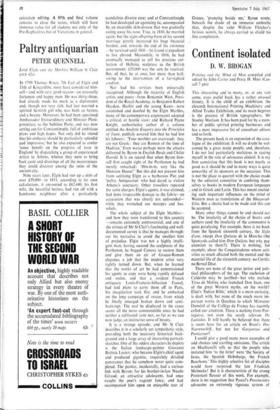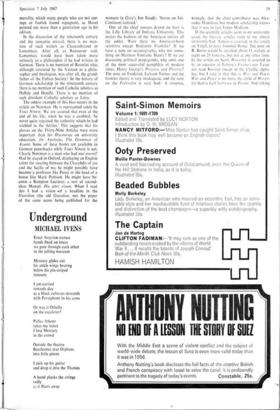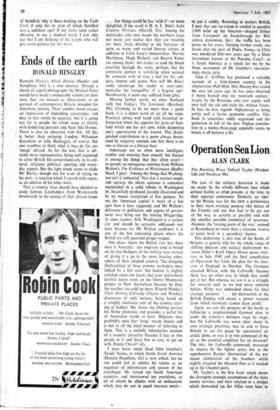Continent isolated
D. W. BROGAN
Printing and the Mind of Man compiled and edited by John Carter and Percy H. Muir (Cas-
sell 7 gns) • This interesting and in many, or, at any rate some, ways useful book has a rather unusual history. It is the child of an exhibition. the eleventh International Printing Machinery and Allied Trades Exhibition, and its main begetter is the greatest of British typographers, Mr Stanley Morison. It has been paid for by a num- ber of public spirited printing businesses and has a most impressive list of consultant editors and so forth.
The present book is an expansion of the cata- logue of the exhibition. It will no doubt be wel- comed by a great many people, and, therefore,
I do not feel particularly malicious in casting myself in the role of advocates diaboli. It is my
firm conviction that this book is not nearly as
good as it should be and in many ways is quite unworthy of its sponsors or the occasion. This
is not the place to quarrel with the choice made by the editorial committee in confining them- selves to books in modern European languages ,;,and in Greek and Latin. This has meant exclud- ing such important influences on the mind of
Western man as translations of the Bhagavad- Gita. But a choice had to be made and this can be accepted.
Many other things cannot be and should not be. The insularity of the choice of books and authors (and the insularity of the comments) is
quite paralysing. For example, there is no book from the Spanish sixteenth century, the Siglo d'oro, except Don Quixote de la Mancha (the Spaniards called him Don Quijote, but why pay attention to them?). There is nothing, for
example, about the Conquistadores whose acti- vities so much affected both the mental and the material life of the sixteenth century; no Cortes; no Bernal Diaz.
There are none of the great jurists and poli- tical philosophers of the age. The exclusion of
Calder6n may be justified—but why exclude Tirso de Molina who launched Don Juan, one of the great Western myths, on the world?
Eliot's 'Indian Bible,' which is a mere curiosity, is dealt with, but none of the much more im- portant works in Quechua to which Monsieur Dumezil of the College de France has recently called our attention. There is nothing from Por-
tuguese, not even the surely relevant Os Lusiadas. It will hardly be believed that there is room here for an article on Grant's Das Narrenschiff, but not for Gargantua and Pantagruel!
I could give a good many more examples of odd choices and startling omissions. The article on Machiavelli tells us that the people who imitated him 'to the letter' were 'the Society of Jesus, the Spanish Habsburgs, the French Bourbons.' This highly selective list of disciples would have - surprised the late Friedrich Meinecke! But it is characteristic of the strong
Protestant flavour of this work. For example, there is no suggestion that Pascal's Provinciales advocates an extremely rigorous system of
morality, which many people who are not cor- rupt or foolish found repugnant, as Havet pointed out more than a generation ago in his edition.
In the discussion of the nineteenth century and the romantic revival, there is no men- tion of such writers as Chateaubriand or Lamennais. After all, as Renouvier said, Lamennais would have been taken more seriously as a philosopher if he had written in German. There is no mention of Rosmini who, although censured by the Vatican as a philo- sopher and theologian, was after all, the grand- father of the Fabian Society! In the history of German scholarship in the nineteenth century there is no mention of such Catholic scholars as Heffele and Denifle. There is no mention of such dissident Catholic scholars as Loisy.
The oddest example of this bias occurs in the article on Newman. He is represented solely by Tract Ninety. We are assured that even at the end of his life, when he was a cardinal, 'he never quite regained the authority which he had wielded in the thirties.' This suggests that his glosses on the Thirty-Nine Articles were more important than his Discourses on university education, the Apologia, The Grammar of Assent. Some of these books are available in German paperbacks while Tract Ninety is not. Clearly Newman is a man who had mal tourne! Had he stayed in Oxford, displaying an English talent for steering between the Charybdis of yes and the Scylla of no, he might possibly have -become a professor like Pusey or the head of a house like Mark Pattison. He might have be- come a Bampton Lecturer, a sort of second- class Mansel. Dis alter visum. When I read this I had a vision of a headline in the Guardian (the old Guardian, not the paper of the same name being published for the
moment in Gray's Inn Road): 'Storm on Isis. Continent isolated.'
One of the chief sources drawn on here is the Lilly Library of Indiana University. This makes the badness of the American entries all the odder. Were there no American-born scientists except Benjamin Franklin? If we have a note on oceanography, why not some- thing on Matthew Fontaine Maury? If we are discussing political propaganda, why omit one of the most successful pamphlets of modern times, Henry George's Progress and Poverty? The note on Frederick Jackson Turner and the frontier theory is very inadequate, and the note on the Federalist is very bad: it assumes, wrongly, that the chief contributor was Alex- ander Hamilton, but modern scholarship knows that it was in fact James Madison.
If the scientific articles seem to me uniformly good, the literary articles seem to me almost uniformly bad. Aeneas is asserted, in the article on Virgil, to have founded Rome. The note on R. Burns would be justified about I I o'clock at night on 25 January, but not at any other time. In the article on Scott, Wareriey is asserted to be an ancestor of Tolstoy's Voyna i mir. I can- not read Russian except in the Cyrillic alpha- bet, but 1 take it that this is War and Peace. War and Peace is no more the child of Waver- ley than is La Chartreuse de Patine. And talking of Stendhal, why is there nothing on the Code Civil, if only for its style of which Stendhal was a sedulous ape? If my views seem rather abrasive, to use a modern word. I can only say that I am thinking of the people who will pay seven guineas for this book.








































 Previous page
Previous page